Dike Road west of Dugualla Bay will be closed for several months this year for improvements that include restoring salmon habitat.
The main changes will help protect State Highway 20 from future flooding risk and raise and widen Dike Road to function as a dike setback.
It will also recreate what was historically an important feeding area for juvenile salmon.
“The Dugualla Bay site has been recognized by numerous state agencies as one of the top salmon restoration priorities in the state,” said to Ryan Elting, conservation director for the Whidbey Camano Land Trust.
Previous improvements to the area has “greatly limited” salmon’s ability to use the area, Elting said, and the Dike Road project will be “restoring the estuary habitat” in Dugualla Bay.
Elting said the Land Trust acquired three properties in the area several years ago and have been managing them as a preserve since that time.
The construction will be completed in partnership with the Washington State Department of Transportation, which has temporarily acquired Dike Road and will give it back to Island County for ongoing maintenance.
The construction project is expected to go out to bid in March with a road closure from June through October.
Currently designated as a local access road, the updated roadway will be raised and expanded to have 11-foot lanes and 5.5-foot shoulders, and changes will be made to the county’s storm water treatment pond access on the west side.
This project will also remove portions of an existing dike located further out in order to reconnect the area to the tides, restoring the wetland nature of the property.
According to 2010 traffic counts from Island County, an average of 883 vehicles use Dike Road each day, according to county documents.
The closure of Dike Road, while temporary, could potentially cause further inconvenience if an accident occurs on nearby Highway 20, according to Public Works Director Bill Oakes. Dike Road has been used as an alternate route in the case of a full blockage of the highway.
“A totally blocking accident will be totally blocking there for those four months,” Oakes said.
Oakes also explained to Island County commissioners last week during work session that the existing soils under Dike Road are highly compressible and settlement periods can normally take up to two years.
In order to reduce the required settlement period to four months, WSDOT will install wick drains to speed up the removal of the groundwater under the roadway, Oakes said.
Other project elements include clearing and grubbing, grading, drainage, signing, illumination, planting, plant establishment and weed control, according to county documents.



